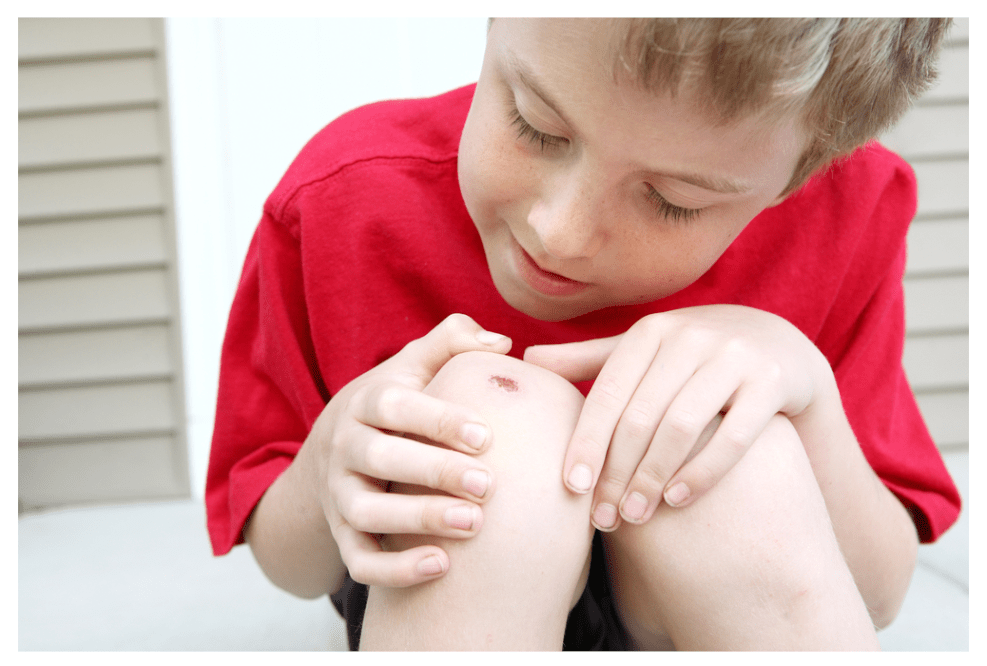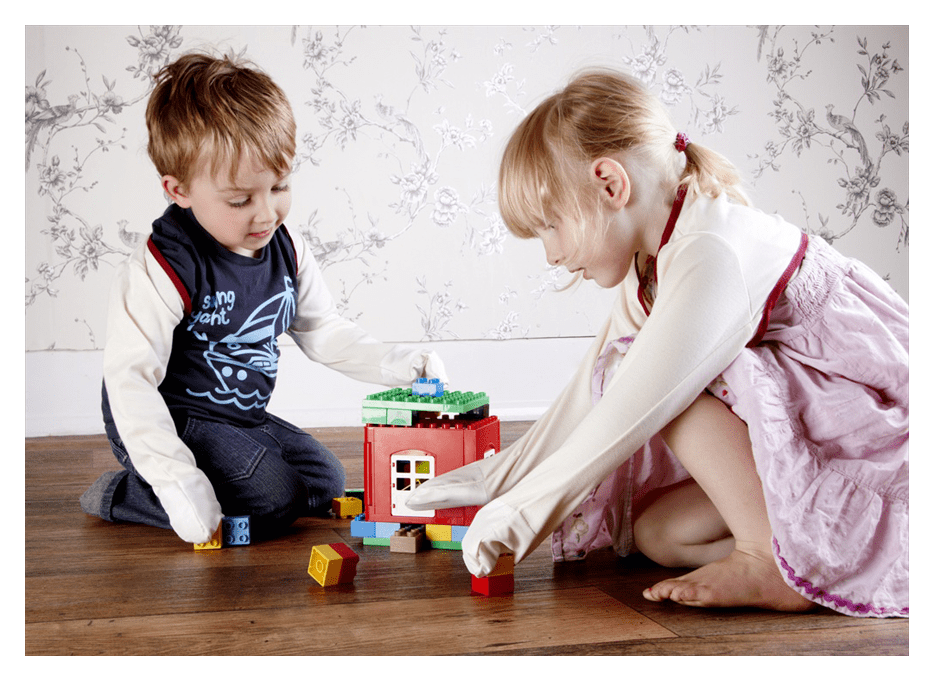Stop Children Picking At Scabs, Stitches & Surgical Dressings
All kids pick at scabs at some point and most of the time it really isn’t a problem. But when your child’s picking is preventing the original wound from healing, or even making it worse, you need to step in to help the wound heal. Stitches and wound covering, from everyday plasters to post-operative surgical dressings, can also be targeted for picking and fiddling. This is the ScratchSleeves guide to helping you stop your child from picking their scabs, stitches and surgical dressings.
Why do kids pick scabs and stitches?
Scabbing over is part of the skin’s healing process, but it’s easy to forget how fascinating this process is for kids. We all know that the healing process can be really itchy, which is enough to tempt the average adult into rubbing or picking a scab but for an inquisitive toddler or child a scab, stitches or dressing just has to be investigated further. What young children don’t understand is that scabs and stitches play an important role in the healing of their skin, and that picking them while the wound is healing could restart the bleeding. While scabs are still something of a novelty, kids are absorbed with them largely because they’re unknown. Explaining what a scab is, what it does and why it should be left alone may help to discourage scratching and picking to some degree.

Why are healing wounds so itchy?
While irritating, experiencing itchy skin around a wound is usually said to be a perfectly normal symptom of the healing process.
There are several different theories as to why we experience itchiness while a wound heals. These include:
Histamines – When injured, the body produces histamines to assist the healing process. These are the same chemicals responsible for the itching and inflammation associated with allergic reactions. A 2018 study suggested that these histamines could be responsible for some of the itchiness that may be experienced when a wound is healing.
Immune system – A 2016 study found that healing wounds and eczema both trigger the same response of the innate immune system, which can lead to some itchiness.
Damage to nerves – If an injury has caused damage to nerve cells, you may experience a neuropathic itch. The healing nerves in the upper layer of the damaged skin send confusing messages to the brain, resulting in more itching in the skin around the injury.
Pulling of new skin – Some experts say that itchiness may be caused by scabs or stitches pulling on the new skin as it forms.
Dry skin – Dryness is also believed to be a possible culprit behind the itchiness of a healing wound, as the oil glands that normally keep skin lubricated and prevent dryness are affected by the damage done during the infliction of the wound.
Why stop a child from picking their scabs
Scabs will fall off of their own accord when the skin underneath is ready for the outside world. Pick them off any sooner, and your child risk damaging the delicate new skin that is forming underneath. At best, this will mean another scab, so the wound takes longer to heal. But the second scab maybe even bigger than the first. The delayed healing is more likely to leave a larger, permanent scar when it finally comes off.
Scabs also play an important role in keeping infections at bay. Picking at a scab, especially with grubby fingers, can introduce fresh bacteria into a healing wound and cause an infection which will further delay healing and may need a course of antibiotics as well. Infections can also make scabs even more itchy, prone to picking and may result in a larger scar.
Also, picking at an itchy scab while daydreaming can quickly turn into a difficult-to-break habit, so it’s a good idea to stop your child from picking their scabs early to prevent a larger problem from developing.
How to stop your child from picking scabs, stitches and surgical dressings
- Vitamin E – Research shows that Vitamin E can help with wound healing. As well as aiding wound healing, Vitamin E rich cream or oil (we’re fans of Bio-Oil) can also help to moisturise dry skin on and around a wound to ease itchiness, which should, in turn, reduce your child feeling to pick at his scabs.
- Dry antiseptic spray –Itching can also be an early sign of infection, so we use a dry antiseptic spray to minimise that source of itching without softening the scab. We have also used the same antiseptic spray on both paper and thread stitches but do check with the doctor that this will be okay with your child’s stitches.
- Cut fingernails really short – Keeping nails really short can reduce the ease of picking, but as kids’ nails grow so quickly, you’ll need to cut or file your little ones nails every few days. Really short fingernails also have the advantage that they tend to harbour less dirt and bacteria than longer ones.
- Cover the wound – covering up the scab or stitches with a plaster or dressing will protect it in the short term. However, this is often not a practical solution either due to the location of the wound, the child’s willingness to have it covered or the dressing itself being itchy. Another drawback of this approach is that covering a wound reduces the amount of air getting to it which promotes bacterial and yeast growth so increasing the risk of infection. The lack of air can also soften the scab, reduce the rate of healing and makes the scab easier to pick.
- Cover fingers or hands: putting plasters over the ends of your child’s fingers can reduce their ability to damage healing wounds. However, the blood supply to the tip of fingers, particularly in young children, is very sensitive to pressure so medical advice is not to encircle the finger with a plaster. Scratch mitts or gloves can work for really little ones but are easy for older children to remove. ScratchSleeves provide an effective and low hassle hand covering solution. Not only do they stay on, but their double layer mitts are specifically designed to minimise the damage done by little fingers and they are easy for adults to put on (and take off) as and when necessary.
- Discourage habit formation. Mindless picking at an itchy scab can quickly turn into a habit so it’s a good idea to prevent this from happening. While distraction is the best tactic with toddlers and younger children, an explanation on why wounds need to be left alone to heal properly and encouragement with a sticker chart may well be more effective with older children.
When to talk to the doctor

Most childhood scabs will heal of their own accord as soon at they are left alone, but occasionally a trip to the doctor is necessary when a wound becomes infected. Signs that a wound has become infected include:
- swelling of the affected area
- pus forming under the scab
- redness spreading from the cut or graze
- increasing pain or itching
- feeling generally unwell, often with a high temperature (38°C or above) or swollen glands
There are lots of reasons why kids like to pick at and play with a scab that’s formed on their skin, but there can be more serious motivations behind some skin-picking behaviour, especially in older children.
Persistent picking at pimples and scabs can indicate anxiety or an obsessive-compulsive disorder that you should discuss with your doctor, especially if your child appears to be creating new scabs rather than just picking at those resulting from the expected scraps and scuffs of childhood.
According to Child Mind Institute, ‘excoriation disorder is characterized by recurrent picking at one’s skin to the point that damage or discomfort is caused.’ If this sounds like your child, then you should discuss your child’s symptoms with your doctor, especially if they appear to be creating new scabs rather than just picking at those resulting from the expected scrapes and scuffs of childhood
However, the vast majority of scab-picking is down to childish curiosity.
Want more information?
Here’s a good place to start: https://kidshealth.org/en/kids/scab.html

Quick buy



